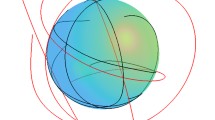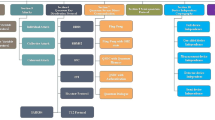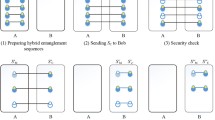Abstract
The impact of diversity on reliable communication over arbitrarily varying channels (AVC) is investigated as follows. First, the concept of an identical state-constrained jammer is motivated. Second, it is proved that symmetrizability of binary symmetric AVCs (AVBSC) caused by identical state-constrained jamming is circumvented when communication takes place over at least three orthogonal channels. Third, it is proved that the deterministic capacity of the identical state-constrained AVBSC is continuous and shows super-activation. This effect was hitherto demonstrated only for quantum communication and for classical communication under secrecy constraints.
Similar content being viewed by others
References
Blackwell, D., Breiman, L., and Thomasian, A.J., The Capacities of Certain Channel Classes under Random Coding, Ann. Math. Statist., 1960, vol. 31, no. 3, pp. 558–567.
Lapidoth, A. and Narayan, P., Reliable Communication under Channel Uncertainty, IEEE Trans. Inform. Theory, 1998, vol. 44, no. 6, pp. 2148–2177.
Csiszár, I. and Körner, J., Information Theory: Coding Theorems for Discrete Memoryless Systems, Cambridge: Cambridge Univ. Press, 2011, 2nd ed.
Ahlswede, R. and Wolfowitz, J., Correlated Decoding for Channels with Arbitrarily Varying Channel Probability Functions, Inform. Control, 1969, vol. 14, no. 5, pp. 457–473.
Schaefer, R.F., Boche, H., and Poor, H.V., Secure Communication under Channel Uncertainty and Adversarial Attacks, Proc. IEEE, 2015, vol. 103, no. 10, pp. 1796–1813.
Csiszár, I. and Narayan, P., The Capacity of the Arbitrarily Varying Channel Revisited: Positivity, Constraints, IEEE Trans. Inform. Theory, 1988, vol. 34, no. 2, pp. 181–193.
Ahlswede, R., Elimination of Correlation in Random Codes for Arbitrarily Varying Channels, Z. Wahrsch. Verw. Gebiete, 1978, vol. 44, no. 2, pp. 159–175.
Ahlswede, R. and Cai, N., Correlated Sources Help Transmission over an Arbitrarily Varying Channel, IEEE Trans. Inform. Theory, 1997, vol. 43, no. 4, pp. 1254–1255.
Schaefer, R.F. and Boche, H., How Much Coordination Is Needed for Robust Broadcasting over Arbitrarily Varying Bidirectional Broadcast Channels, in Proc. 2014 IEEE Int. Conf. on Communications (ICC’2014), Sydney, Australia, June 10–14, 2014, pp. 1872–1877.
Boche, H. and Schaefer, R.F., Capacity Results, Coordination Resources, and Super-activation in Wiretap Channels, in Proc. 2013 IEEE Int. Sympos. on Information Theory (ISIT’2013), Istanbul, Turkey, July 7–12, 2013, pp. 1342–1346.
Smith, G. and Yard, J., Quantum Communication with Zero-Capacity Channels, Science, 2008, vol. 321, no. 5897, pp. 1812–1815.
Boche, H., Schaefer, R.F., and Poor, H.V., On Arbitrarily Varying Wiretap Channels for Different Classes of Secrecy Measures, in Proc. 2014 IEEE Int. Sympos. on Information Theory (ISIT’2014), Honolulu, HI, USA, June 29–July 4, 2014, pp. 2376–2380.
Nötzel, J., Wiese, M., and Boche, H., The Arbitrarily Varying Wiretap Channel—Secret Randomness, Stability, and Super-activation, IEEE Trans. Inform. Theory, 2016, vol. 62, no. 6, pp. 3504–3531.
Schaefer, R.F., Boche, H., and Poor, H.V., Super-activation as a Unique Feature of Arbitrarily Varying Wiretap Channels, in Proc. 2016 IEEE Int. Sympos. on Information Theory (ISIT’2016), Barcelona, Spain, July 10–15, 2016, pp. 3077–3081.
Ahlswede, R., A Note on the Existence of the Weak Capacity for Channels with Arbitrarily Varying Channel Probability Functions and Its Relation to Shannon’s Zero Error Capacity, Ann. Math. Statist., 1970, vol. 41, no. 3, pp. 1027–1033.
Shannon, C.E., The Zero Error Capacity of a Noisy Channel, IRE Trans. Inform. Theory, 1956, vol. 2, no. 3, pp. 8–19.
Alon, N., The Shannon Capacity of a Union, Combinatorica, 1998, vol. 18, no. 3, pp. 301–310.
Ericson, T., Exponential Error Bounds for Random Codes in the Arbitrarily Varying Channel, IEEE Trans. Inform. Theory, 1985, vol. 31, no. 1, pp. 42–48.
Leung, D. and Smith, G., Continuity of Quantum Channel Capacities, Comm. Math. Phys., 2009, vol. 292, no. 1, pp. 201–215.
Boche, H. and Nöotzel, J., Positivity, Discontinuity, Finite Resources, Nonzero Error for Arbitrarily Varying Quantum Channels, in Proc. 2014 IEEE Int. Sympos. on Information Theory (ISIT’2014), Honolulu, HI, USA, June 29–July 4, 2014, pp. 541–545.
Boche, H., Schaefer, R.F., and Poor, H.V., On the Continuity of the Secrecy Capacity of Compound and Arbitrarily Varying Wiretap Channels, IEEE Trans. Inf. Forensics Secur., 2015, vol. 10, no. 12, pp. 2531–2546.
Arendt, C., Nöotzel, J., and Boche, H., Super-activation of the Composite Independent Arbitrarily Varying Channel under State Constraints, in Proc. IEEE Global Communications Conf. (GLOBECOM’2017), Singapore, Dec. 4–8, 2017, pp. 1–6.
Nötzel, J. and Swetly, W., Deducing Truth from Correlation, IEEE Trans. Inform. Theory, 2016, vol. 62, no. 12, pp. 7505–7517.
Noötzel, J. and Arendt, C., Using Dependent Component Analysis for Blind Channel Estimation in Distributed Antenna Systems, in Proc. 2016 Global Conf. on Signal and Information Processing (GlobalSIP’2016), Washington, DC, USA, Dec. 7–9, 2016, pp. 1116–1121.
Ahlswede, R. and Cai, N., Arbitrarily Varying Multiple-Access Channels. II: Correlated Sender’s Side Information, Correlated Messages, and Ambiguous Transmission, in Proc. 1997 IEEE Int. Sympos. on Information Theory (ISIT’97), Ulm, Germany, June 29–July 4, 1997, p. 23.
Boche, H. and Nöotzel, J., Positivity, Discontinuity, Finite Resources, and Nonzero Error for Arbitrarily Varying Quantum Channels, J. Math. Phys., 2014, vol. 55, no. 12, p. 122201 (20 pp.).
Stiglitz, I.G., Coding for a Class of Unknown Channels, IEEE Trans. Inform. Theory, 1966, vol. 12, no. 2, pp. 189–195.
IEEE 802.11-2016: IEEE Standard for Information Technology—Telecommunications and Information Exchange between Systems. Local and Metropolitan Area Networks—Specific Requirements. Part 11: Wireless LAN Medium Access Control (MAC) and Physical Layer (PHY) Specifications. 2016.
ETSI ES 202 663 V1.1.0 (2009-11): ETSI Standard Intelligent Transport Systems (ITS); European Profile Standard for the Physical and Medium Access Control Layer of Intelligent Transport Systems Operating in the 5 GHz Frequency Band. Final draft, 2011.
Uhlemann, E., Initial Steps toward a Cellular Vehicle-to-Everything Standard [Connected Vehicles], IEEE Veh. Technol. Mag., 2017, vol. 12, no. 1, pp. 14–19.
Khan, A., Almeida, J., Fernandes, B., Alam, M., Pedreiras, P., and Ferreira, J., Towards Reliable Wireless Vehicular Communications, in Proc. 2015 IEEE 18th Int. Conf. on Intelligent Transportation Systems (ITSC’2015), Canary Islands, Spain, Sept. 15–18, 2015, pp. 167–172.
Arendt, C., Nöotzel, J., and Boche, H., Evaluation of Distributed Post-Detection Receive Diversity Combining Schemes for Reliable Wireless Communication over Arbitrarily Varying Channels, in Proc. 2018 IEEE 88th Vehicular Technology Conf. (VTC-Fall), Chicago, IL, USA, Aug. 27–30, 2018, pp. 1–6.
Acknowledgement
The first author would like to thank P. Fertl and A. Posselt from the BMW Group for supporting his studies. Moreover, the authors would like to thank an unknown reviewer for useful comments and detailed examination of the present manuscript.
Author information
Authors and Affiliations
Corresponding authors
Additional information
Russian Text © The Author(s), 2019, published in Problemy Peredachi Informatsii, 2019, Vol. 55, No. 2, pp. 3–27.
Rights and permissions
About this article
Cite this article
Arendt, C., Nötzel, J. & Boche, H. Reliable Communication under the Influence of a State-Constrained Jammer: An Information-Theoretic Perspective on Receive Diversity. Probl Inf Transm 55, 101–123 (2019). https://doi.org/10.1134/S0032946019020017
Received:
Revised:
Accepted:
Published:
Issue Date:
DOI: https://doi.org/10.1134/S0032946019020017




